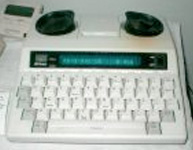Persons who communicate with TTYs should dial 9-1-1 directly and not go through the 7-1-1 relay service. The Americans with Disabilities Act requires that all 9-1-1 centers be capable of communicating directly with persons using a TTY. (http://www.ada.gov/911ta.htm) All of New Jersey's 9-1-1 centers meet this standard. If a person calls in through a relay center it will delay direct access to emergency services and defeat many of the enhanced features of the 9-1-1 system.
When someone uses a voice carry over device, also known as a "captioned telephone", the 9-1-1 call will go directly to the 9-1-1 center without being routed through the relay service. The VCO device may transmit TTY tones or play a recorded message to alert the 9-1-1 operator that the call is being made from a voice carry over phone. If your device does not have either of these options, it is helpful to alert the 9-1-1 call taker that they must transmit their messages using the TTY but that you will be able to speak the replies.
Persons who are able to hear but cannot speak may use Hearing Carry Over communications. When the HCO user dials 9-1-1, the caller and the 9-1-1 operator will communicate using TTY mode.
It is not recommended that persons who use IP or video relay use it to call 9-1-1 if another option such as a TTY is available. 9-1-1 centers are not yet capable of directly receiving IP or video messages. Persons who communicate through a video service will still have to go through the relay service. The relay service will contact the appropriate 9-1-1 center for the location of the caller. The 9-1-1 operator will not receive the caller's location or call back number on the 9-1-1 answering equipment. They will get a message alerting them that the call is being sent through a third party.
Please do not call 9-1-1 "just to see if it works". If you would like to test your communications device please contact the 9-1-1 center through a non-emergency number to schedule a test call. This will avoid having your call interfere with emergency calls during a busy period. Many 9-1-1 centers do not get many calls from TTY users or by the other methods mentioned here. See if they would like to schedule practice sessions as time allows. Also remember, although the 9-1-1 operators are trained in the use of the TTY, some of the protocols and abbreviations may be unfamiliar to them. If they forget to message a "GA" at the end of a statement and a long pause occurs, proceed with a response. If it appears some part of your message was misunderstood, try rephrasing it. By working together we will be sure that the emergency assistance needed will be sent.
